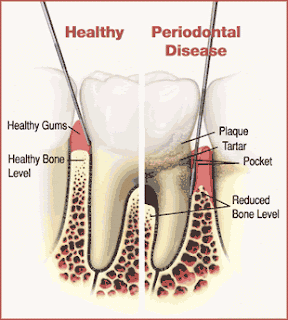Healthy gum tissue fits like a cuff around each tooth. When someone has periodontal disease, the gum tissue pulls away from the tooth. As the disease gets worse, the tissue and bone that support the tooth are destroyed. Over time, teeth may fall our or need to be removed. Treating gum disease in the early stages can help prevent tooth loss.
How do I know if I have gum disease?
It can be hard to know. You can have periodontal disease without clear symptoms. That's why regular dental exams are so important.
If you notice any of these signs, see your dentist:
- gums that bleed during brushing and flossing
- red, swollen or tender gums
- gums that have pulled away from your teeth
- bad breath that doesn't go away
- pus between your teeth and gums
- loose or separating teeth
- a change in the way your teeth fit together when you bite
- a change in the fit of partial dentures
Periodontal disease is caused by plaque, a sticky film that if always forming on your teeth. Plaque contains bacteria that produce harmful toxins. If teeth are not cleaned well, the toxins can irritate and inflame the gums.
Inflamed gums can pull away from the teeth and form spaces called pockets. The pockets provide a space for more bacteria. If the infected pockets are not treated, the disease can get worse. The bone and other tissues that support teeth are damaged.
Other factors that may contribute to gum disease include:
- smoking or chewing tobacco
- diseases like diabetes, blood cell disorders, HIV infections and AIDS that lower the body's resistance to infection, making periodontal diseases more severe.
- crooked teeth or worn, loose or cracked fillings that may trap plaque
- pregnancy, use of birth control pills, or changes in female hormone levels
- certain medicines, such as steroids, some anti-epilepsy drugs, cancer therapy drugs, and some calcium channel blockers
- stress
- genetics
Patients with periodontal, or gum, disease usually need more frequent dental visits than the average patient. Your dental team can treat the disease with special deep cleanings, sometimes combined with medication to treat the infection. Advanced gum disease may require additional treatment.

No comments:
Post a Comment